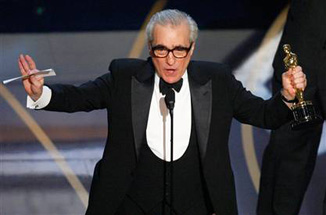Top 12 Film Industry Stories of 2007 : #5:
Martin Scorsese No Longer a Bridesmaid
By Kim Hollis
December 30, 2007
BoxOfficeProphets.com

It all started back in 1981, when Scorsese was nominated for a Best Director Academy Award for his work on Raging Bull. That year, he lost to Robert Redford, who took home the prize for Ordinary People. Scorsese's next chance came in 1989, when the Academy appreciated his work on the controversial The Last Temptation of Christ enough to give him another chance. Once again, Scorsese was a bridesmaid as Barry Levinson was awarded the Best Director Oscar for Rain Man.
In 1991, Scorsese had two chances at an Academy Award, one for directing and one for writing on the masterpiece Goodfellas, a deserving film if ever there was one. Losing to actor-turned-director Robert Redford was probably not too terrible, but losing Best Director to Kevin Costner for Dances With Wolves might have been. Dances With Wolves likewise took the screenplay award, meaning Scorsese went home empty handed once again.
He had another opportunity just three years later, as in 1994 Scorsese was nominated for Adapted Screenplay for The Age of Innocence. It was a phenomenally tough year to be a nominee in this category, though, as he was up against Shadowlands, Remains of the Day, In the Name of the Father and eventual winner Schindler's List, a movie that dominated that year's awards with seven wins.
It was nearly a decade before Scorsese had his next opportunity, though he was up against it in 2003 when Gangs of New York got him another Director nomination. Roman Polanski took the Oscar for The Pianist, or he would have if he weren't in exile from the United States to avoid imprisonment for having sex with a 13-year-old girl. At this point, frustration had to be kicking in. If you can't beat actors and alleged pedophiles, how can you ever win?
Yet another chance at Best Director came in 2005, but – you guessed it – Scorsese lost to yet another actor-turned-helmer (albeit a highly respected one in Clint Eastwood). The Aviator was precisely the type of project that the Academy typically likes to reward – sweeping, epic, grand and glorious. But Million Dollar Baby was a moving film with fine performances and was shot in a manner of days, coming from nowhere to be the dominant force during awards season.
Scorsese had to be feeling a sense of resignation when he was nominated yet again this year, this time for The Departed. He went up against fantastic competitors, including Stephen Frears (The Queen), Alejandro Gonzalez Inarritu (Babel), Paul Greengrass (United 93) and once again Eastwood (Letters from Iwo Jima). In the end, though, The Departed was the right film at the right place in the right time for Scorsese. Not only did he take home the Oscar for Best Director, but the movie also won Best Picture, Adapted Screenplay and Editing awards. Scorsese claims that in the end, he is okay with the fact that it took so long to win, as he believes winning earlier in his career would have affected his approach to filmmaking.
Looking to the future, Scorsese continues to follow his own singular muse. In 2008, Shine a Light, a documentary on the Rolling Stones will see release, and he'll begin production on Shutter Island, a movie that will reunite him once again with Leonardo DiCaprio. He also has an adaptation of the highly regarded Shusaku Endo novel Silence in the works, along with a biopic of Theodore Roosevelt. With all these projects on his plate, it certainly looks like opportunities for a repeat performance at the Academy Awards are in the offing.